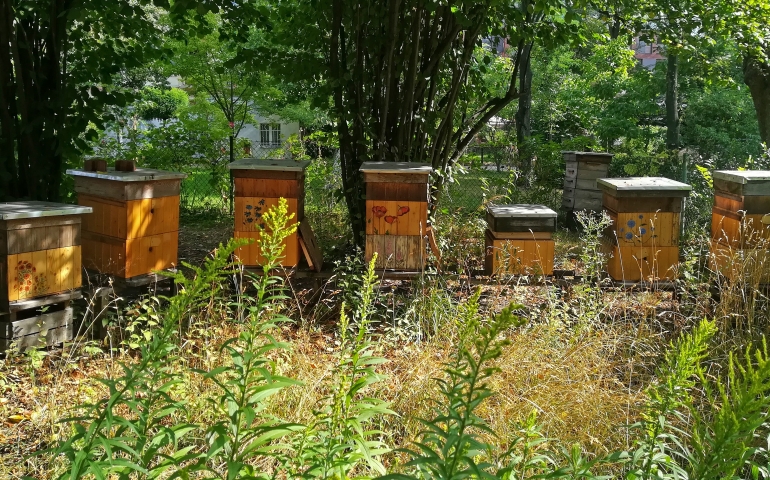Contact
Bees are rich in terms of biodiversity protection, education development and touristic attraction. Transferring the practice of Lubljana, Bydgoszcz develop its own approach of connecting sites in the city that are bee-friendly and where apiaries can be visited. This is also included in a wider campaign for bee awareness and protection.
Bydgoszcz is the eighth largest city in Poland, part of the Bydgoszcz–Toruń metropolitan area, set on the on the Brda and Vistula rivers in northern Poland. It is an increasingly important economic centre, but the city is well known for its water, Art Nouveau buildings, and urban greenery – including the largest city park in Poland (830 ha).
The city has a dynamic approach to sustainable development as part of its efforts to improve the quality of life of the city’s inhabitants. Against this background, Bydgoszcz wanted to link its agricultural land and green spaces with ecological education and took a particular interest in Ljubljana’s approach to connecting sites in the city that are bee-friendly and where apiaries can be visited.
The City started to test and promote the quality of Bydgoszcz honey and used World Bee Day to implement a campaign on the ‘Urban reality of bees and people - let’s create a more bee-friendly world’, including photos at bus and tram stops, and messages on billboards. A local biologist produced a brochure on proper human behaviour towards bees and an exhibition.
But for ULG Coordinator, Justyna Olszewska, a highlight was local teachers getting enthusiastic about teaching children about bees. They developed a new educational programme called “With Bees Throughout the Year”, which gives children the opportunity to get to know about bees, beekeeping and related topics around health, plants and nature.
The approach undertaken by Bydgoszcz is fully aligned with the integrated approach of the Practice of Ljubljana that it transferred. Ecological practices related to beekeeping have been developed. The new EU project “Bez Lipy” introduces participatory approach to greenery development and a member of URBACT local group participates in the works.
The practice is also focusing on children and their education and attitude towards bees. This has also meant the development of professional skills and capacity to raise their awareness and develop bee-related activities as well as the enlargement of the network of urban beekeepers in the city. The city also promotes new (touristic) products and services related to beekeeping such as educational workshops run by Dawid Kilon, a biologist, guide and draftsman and bee-keeping workshops run at WSG University of Economy in Bydgoszcz.
Bydgoszcz municipality formed an URBACT Local Group (ULG) mixing around 30 members - beekeepers, teachers, entrepreneurs, researchers, local tour guides and interested individuals. The group identified 16 places in the city with apiaries and melliferous potential to appear on their own Bee Path map of 16 stops – from a roof on the university, through Shopping Mall with beehives, pollinator houses in city parks, sensory garden at school, Bydgoszcz Soap Works to the botanical garden.
In 2018 the City of Bydgoszcz lifted the ban on beekeeping in the city centre. Within the project we have managed to get to know beekeepers and educators who are ready to share their knowledge – in the very 2021 there are new beehives in the city centre: in May an apiary was installed by Mateusz Andryszak in Ostromecko Park and Palace Ensemble, and in June another one was installed in the Biziel University Hospital (Mateusz guided the endeavour). There are more and more bees initiatives application within the city grants and Bydgoszcz Citizens’ Participatory Budget, e.g. in 2022 there will be a municipal beehive installed and a bee-themed playground. Bydgoszcz is also starting the promotion of the Bee Education Programme in schools and we celebrate World Bee Day by installing the exhibition on bees that is accessible and offered to download and use as an open source and to be installed in any other city that wishes to educate about bees.
Visiting Ljubljana in April 2019 - together with stakeholders of BeePathNet’s other partner cities - members of Bydgoszcz’s ULG were truly inspired by how they too could create their own story around bees, linking to history, architecture and natural values.
The city hopes to install the popular bee educational programme across the whole education sector, from kindergarten up. There are also plans that Ania Izdebska with the local Tourist Office will create a ‘Bee Quest Game’ that will complement the town’s existing game for visitors.
Finally, the city also plans to explore further business opportunities and promotion, to take advantage of the growing interest in the project - including in other towns in the region.

